Search Our Whole site:
Just Search: Global

Global Disability Innovation Hub becomes the worlds first WHO Collaborating Centre on Assistive Technology
The Global Disability Innovation Hub (GDI Hub), based at UCL, is the first organisation to be awarded the status of World Health Organisation (WHO) Official Collaborating Centre on Assistive Technology (AT). Led by GDI Hub’s Academic Director, Professor Cathy Holloway, the WHO Collaborating Centre will focus on driving global disability innovation to work towards a fairer world through access to assistive and accessible technology.
First ever global guide for assistive technology to improve the life of millions
The new WHO Assistive Products Specifications is the first global guide for quality-assured assistive products, containing specs for 26 prioritised assistive products, including the minimum quality requirements for manufacturing. Funded by UK Aid under the AT2030 programme, the work is a major milestone to drive high quality, affordable AT globally.
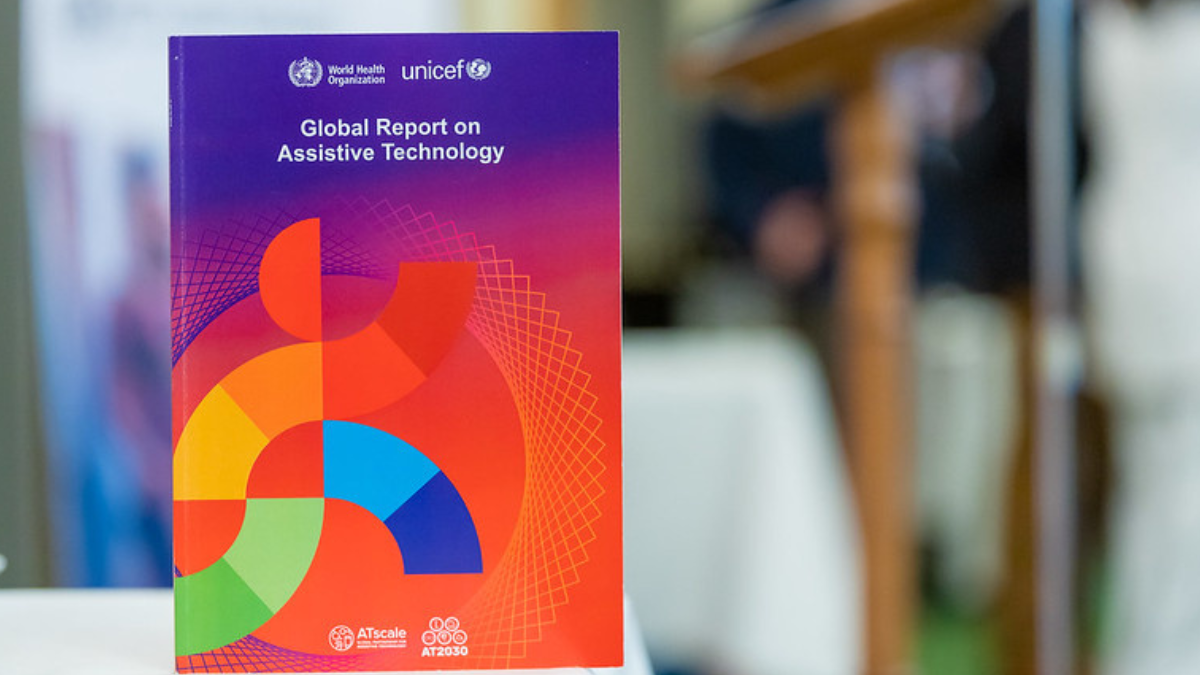
Global Report on Assistive Technology is launched - setting the roadmap for improving access to assistive technology for everyone
There is a large, unmet need for assistive technology worldwide. The WHO-UNICEF Global Report on Assistive Technology will play an instrumental role in setting the global roadmap for improving access to assistive technology for everyone, everywhere.

UK aid announces £31 million to improve access to life-changing Assistive Technology for all, backing increased ground-breaking innovation and research by the AT2030 programme, led by Global Disability Innovation Hub, at UCL.
The UN annual Disability conference at the United Nations in New York, Rt Hon Tom Pursglove MP, Minister of State for Disabled People, Health and Work in the UK, announced that UK Aid would invest a further £31 million into the AT2030 programme, led by GDI Hub, to reach 9 million more people directly and 12 million more people indirectly with life-changing accessible technology.

New report calls for global action for children and adults with clubfoot
A new report by the Clinton Health Access Initiative (CHAI) for AT2030, a UK Aid-funded program led by the Global Disability Innovation Hub (GDI Hub), aims to drive progress for children and adults with clubfoot to reach their full potential.
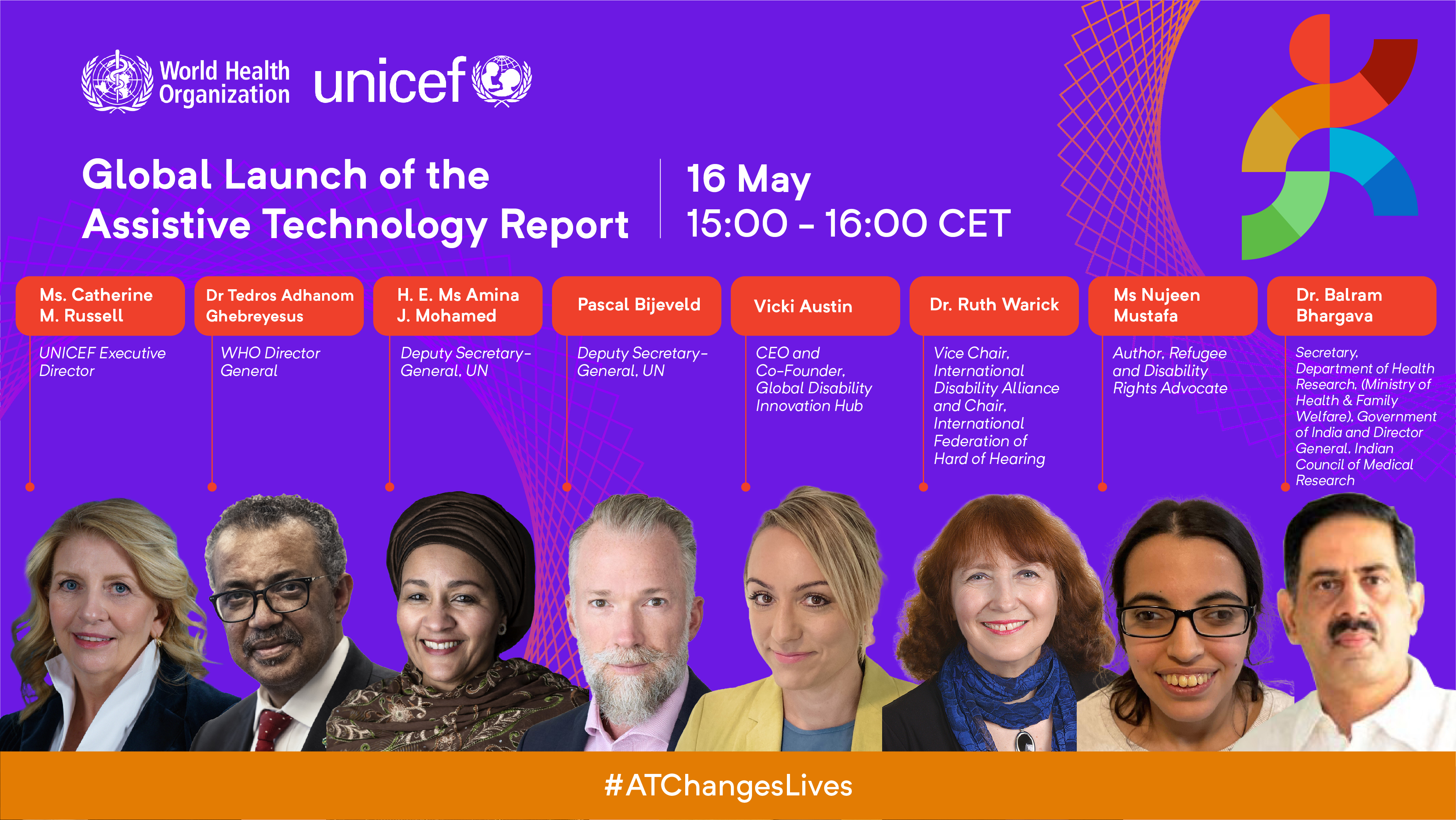
Global Report on Assistive Technology due to be launched!
16th May 2022 marks the launch of the first ever Global Report for Assistive Technology
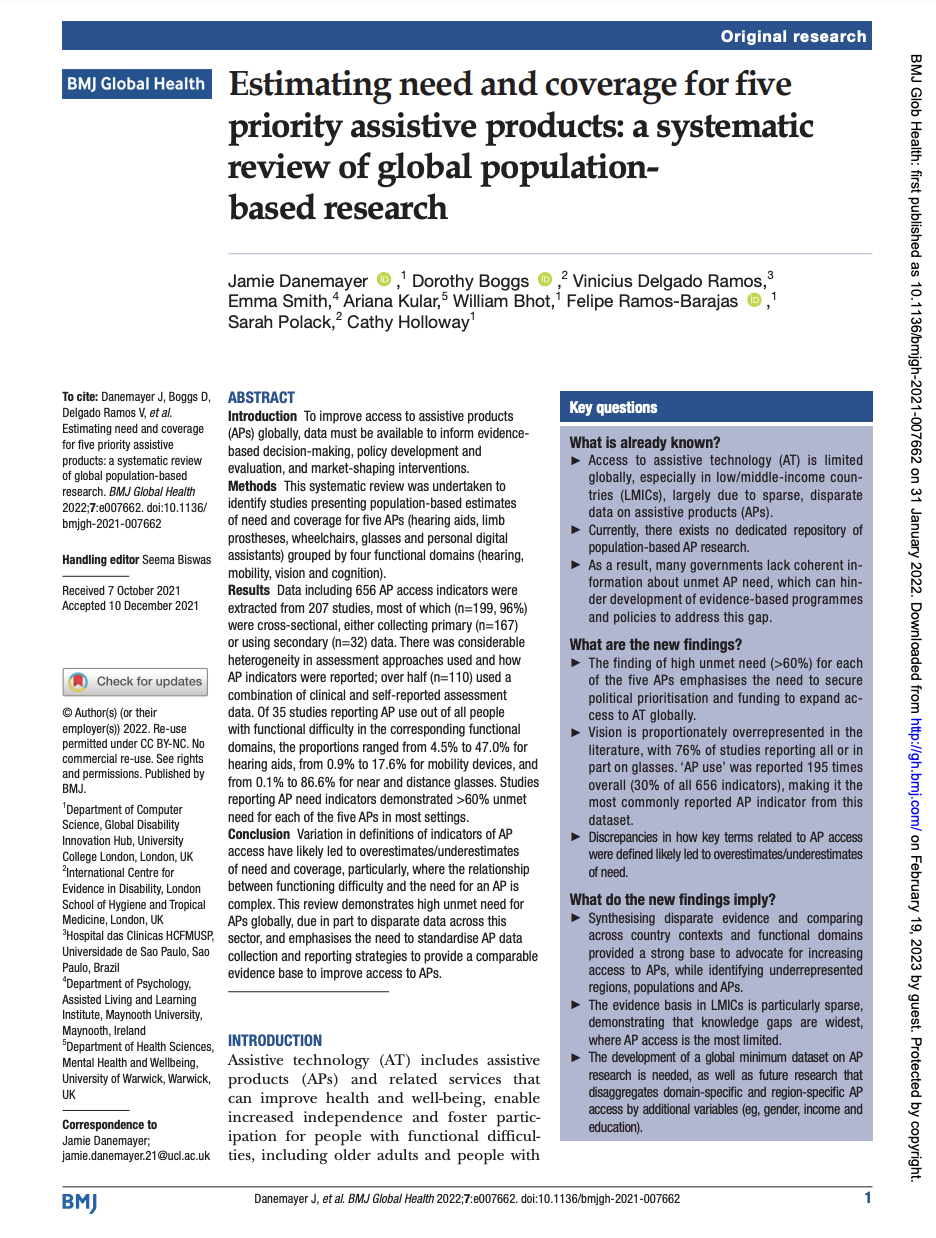
Estimating need and coverage for five priority assistive products: A systematic review of global population based research
This systematic review collates data extracted from 207 studies, presenting indicators of population-level access to AT globally.
Assistive Tech Impact Fund launches global call for innovative African solutions
The Assistive Tech Impact Fund (ATIF) is changing the prospects of AT innovators in Africa, providing up to £200k of grant funding alongside expert-led venture-building support to facilitate the growth of the AT sector.
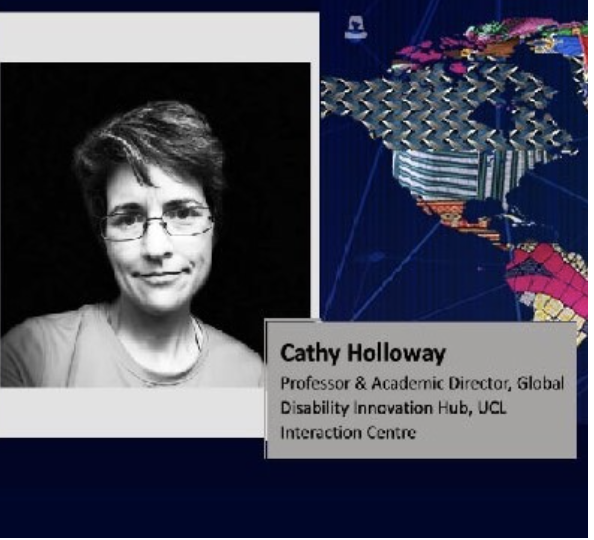
Professor Catherine Holloway at UNESCO: Global Media and Information Literacy Week
On 29th October, Professor Catherine Holloway was invited to speak as a research partner of UNESCO and advocated for the need of technology to account for the needs of the population. The event was held virtually and organised by The Permanent Mission of Chile in its capacity of Presidency of the Group of Friends of Older Persons, UNESCO, WHO and ITU.
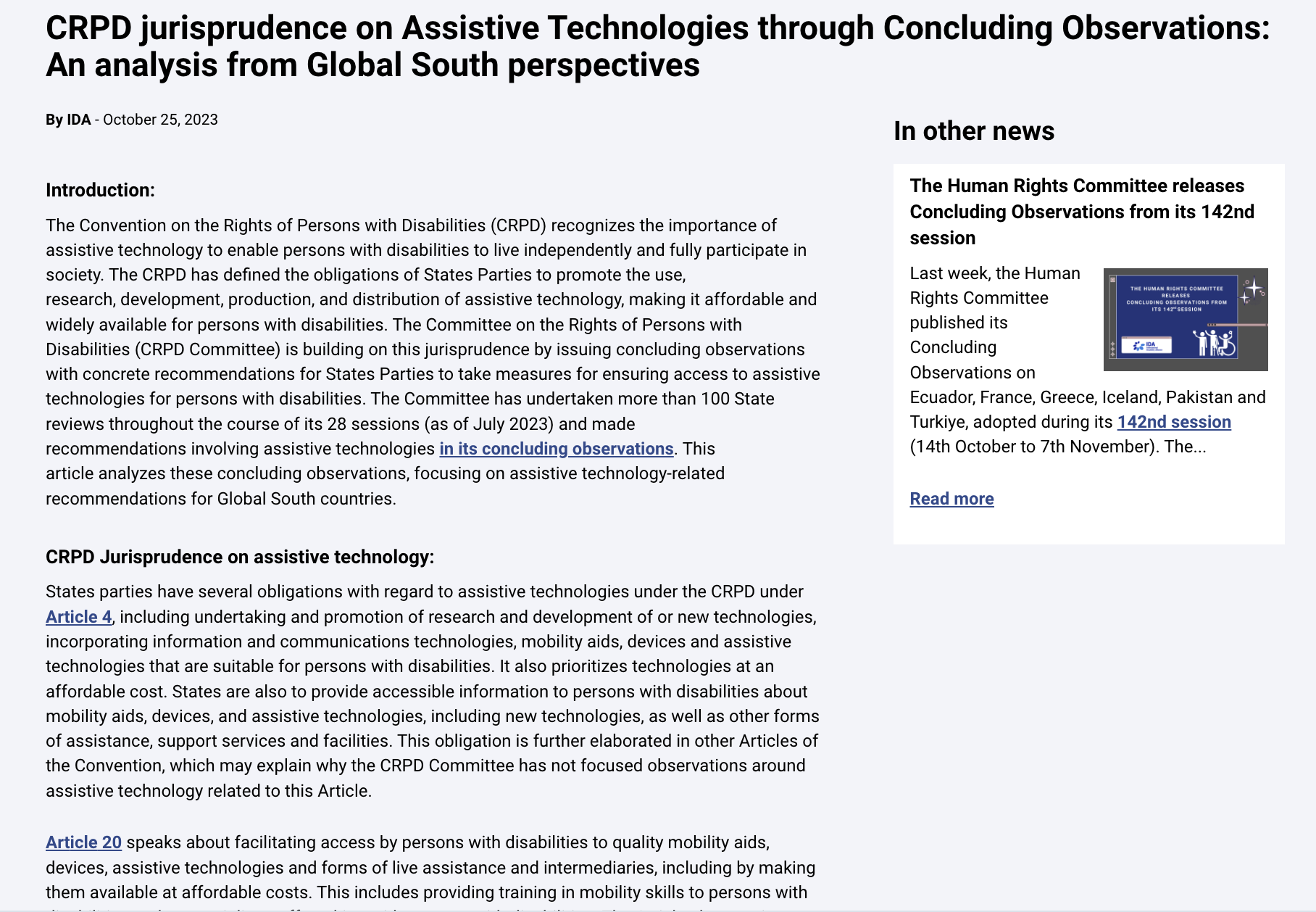
CRPD jurisprudence on Assistive Technologies through Concluding Observations: An analysis from Global South perspectives
The Convention on the Rights of Persons with Disabilities (CRPD) recognizes the importance of assistive technology to enable persons with disabilities to live independently and fully participate in society. The CRPD has defined the obligations of States Parties to promote the use, research, development, production, and distribution of assistive technology, making it affordable and widely available for persons with disabilities.
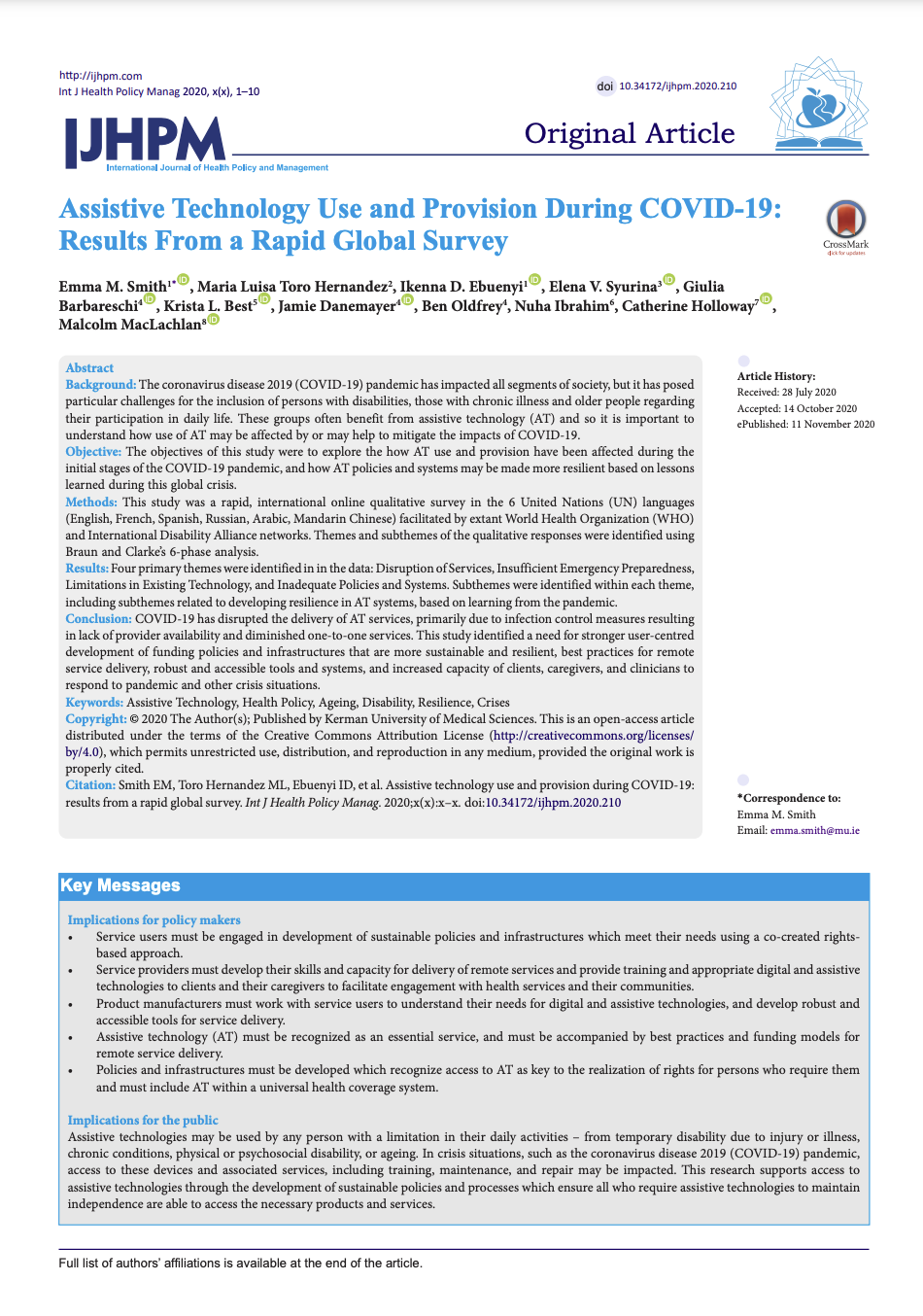
Assistive Technology Use and Provision During COVID19: Results From a Rapid Global Survey
The coronavirus disease 2019 (COVID-19) pandemic has impacted all segments of society, but it has posed particular challenges for the inclusion of persons with disabilities, those with chronic illness and older people regarding their participation in daily life. These groups often benefit from assistive technology (AT) and so it is important to understand how use of AT may be affected by or may help to mitigate the impacts of COVID-19.
Global Assistive Technology User Network - launch events
International Disability Alliance, Global Disability Innovation Hub, UK aid funded AT2030 programme and ATscale, the Global Partnership for Assistive Technology are delighted to be launching the Global Assistive Technology User Network, a global platform for collaboration, networking, exchange and conversation about Assistive Technologies.
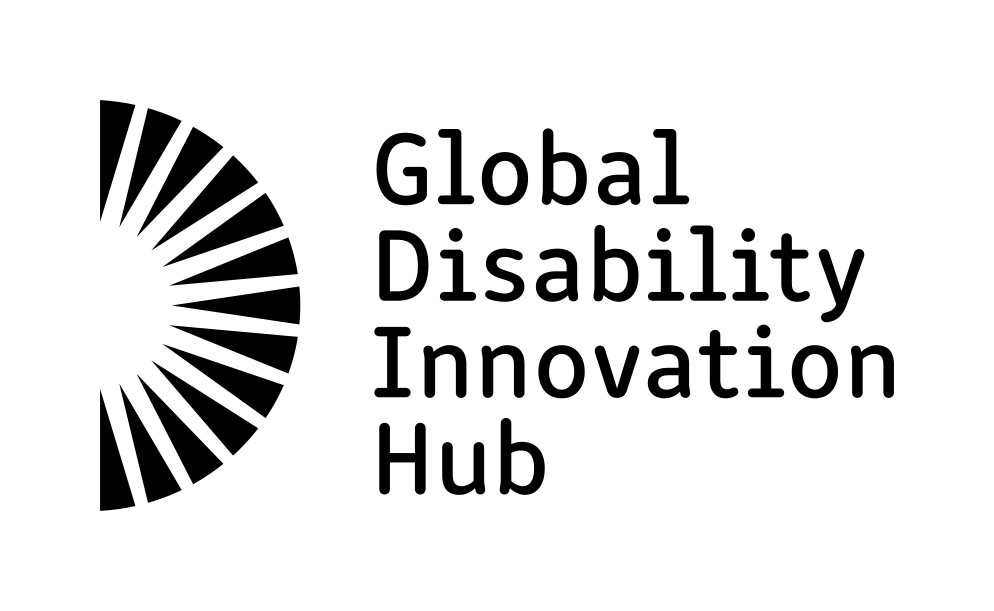
Do we have the right Global Strategy to build access to Assistive Technology?
Vicki discusses the importance of global partnerships to address the gap to access assistive technology.

Global moments can and do change the way we see the world: reflections from Jenny Sealey and Bradley Hemmings: Co-artistic directors of the Paralympic Opening Ceremony, 2012
The magnificent 2012 Paralympic Games were a game-changer - a Big Bang for the Paralympic Movement. Never before had a Paralympic Games achieved such record breaking attendance, with the stadium selling out, national and international broadcast attention and a global audience of 3.8 billion. Hear reflections from Jenny Sealey and Bradley Hemmings: Co-artistic directors of the Paralympic Opening Ceremony, 2012 as they explore how global moments can and do change the way we see the world.
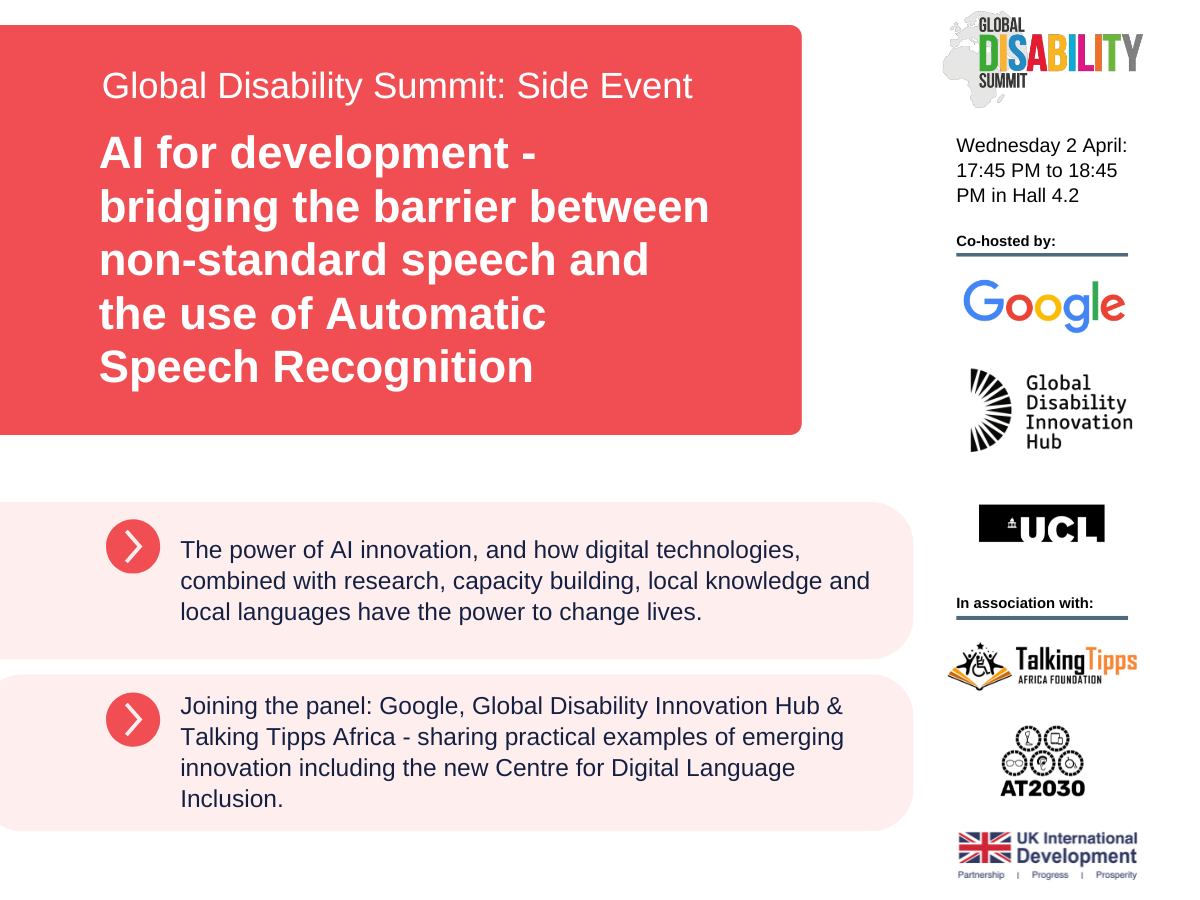
Global Disability Summit: Side Event Al for development - bridging the barrier between non-standard speech and the use of Automatic Speech Recognition
This side event, co-hosted by the Global Disability Innovation Hub and Google at the Global Disability Summit (GDS), explores the intersection of AI and Automatic Speech Recognition (ASR), focusing on bridging the gap for people with non-standard speech. Through digital innovation and local expertise, AI holds transformative potential to enable better communication for individuals with speech challenges.
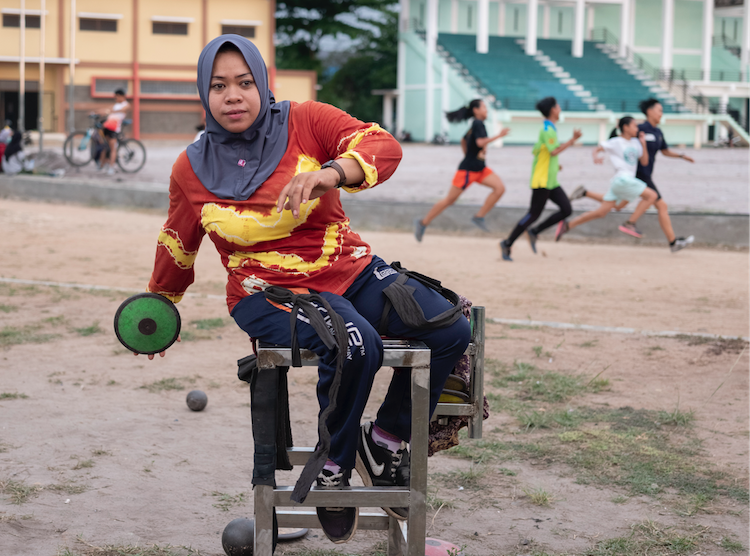
UK Aid funding to support 10.5 million more people with access to life changing Assistive Technology through three innovative investments
Today, on International Day of Persons with Disabilities, Global Disability Innovation Hub (GDI Hub) is proud to announce three new innovative investments to reach an additional 10.5 million people as part of the UK Aid funded AT2030 programme.
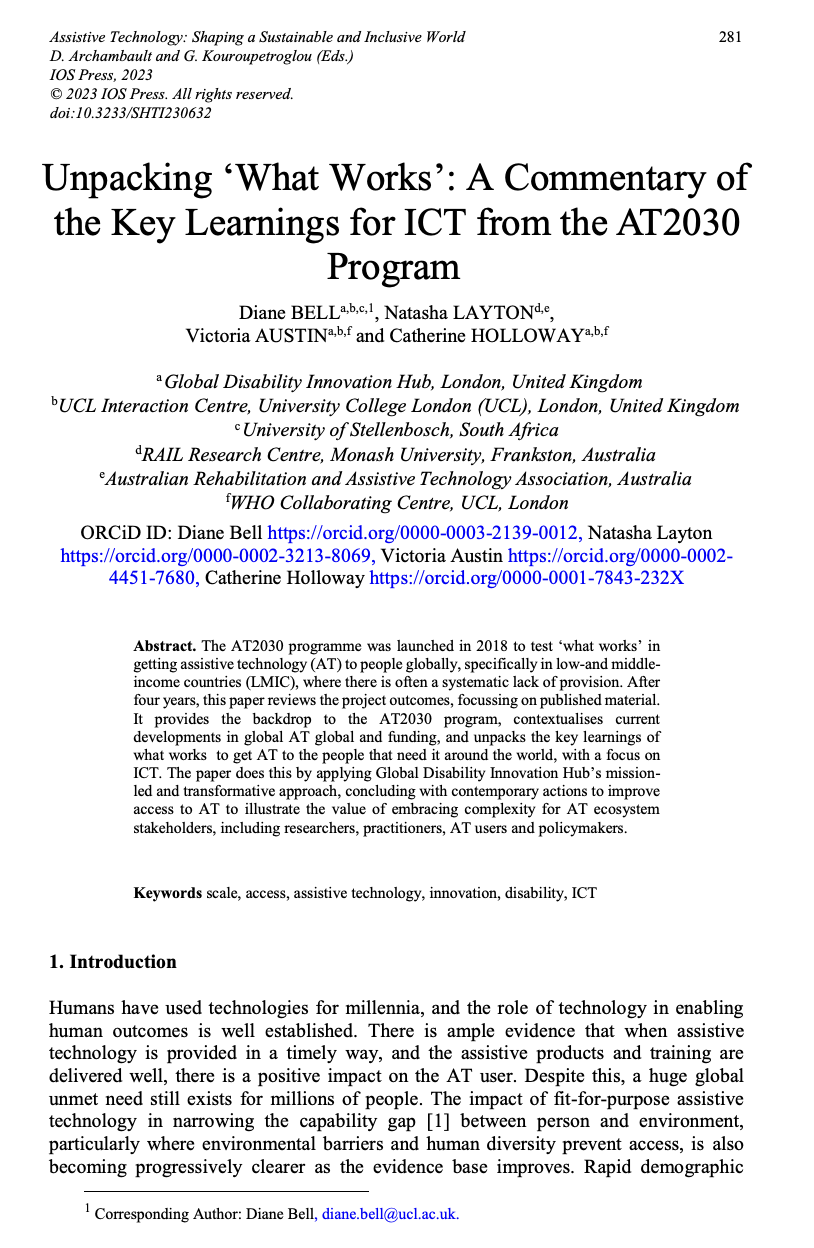
Unpacking ‘What Works’: A Commentary of the Key Learnings for ICT from the AT2030 Program
The AT2030 programme was launched in 2018 to test ‘what works’ in getting assistive technology (AT) to people globally, specifically in low- and middle-income countries (LMIC), where there is often a systematic lack of provision. After four years, this paper reviews the project outcomes, focussing on published material. It provides the backdrop to the AT2030 program, contextualises current developments in global AT global and funding, and unpacks the key learnings of what works to get AT to the people that need it around the world, with a focus on ICT.
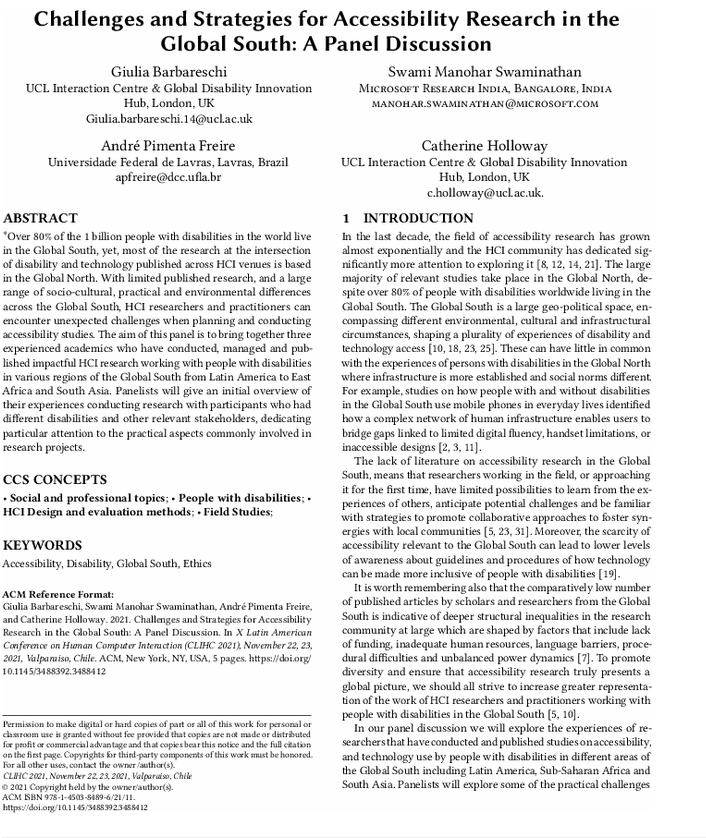
Challenges and Strategies for Accessibility Research in the Global South: A Panel Discussion
Over 80% of the 1 billion people with disabilities live in the Global South, yet most HCI research on disability and technology is from the Global North. This lack of research, along with diverse socio-cultural factors, creates challenges for accessibility studies in the Global South. This panel features three experienced academics who will share their insights from conducting impactful HCI research with disabled individuals across regions like Latin America, East Africa, and South Asia, focusing on practical aspects of engaging participants and stakeholders.
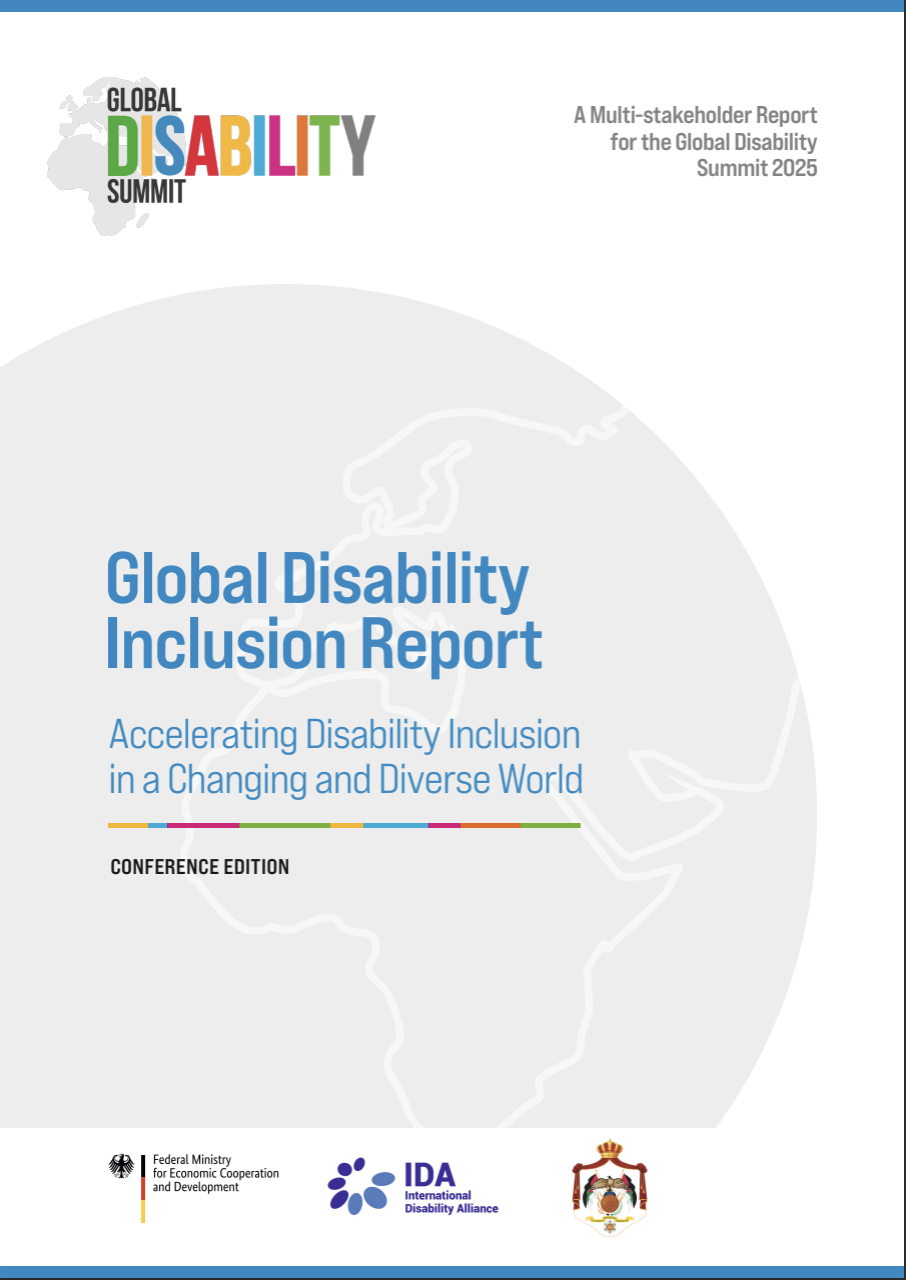
The Global Disability Inclusion Report: Accelerating Disability Inclusion in a Changing and Diverse World
The Global Disability Inclusion Report: Accelerating Disability Inclusion in a Changing and Diverse World was developed specifically for the Global Disability Summit 2025. It provides an overview of how the profound changes shaping our world impact the diversity of persons with disabilities and pathways to address these changes and drive inclusion across all aspects of life.
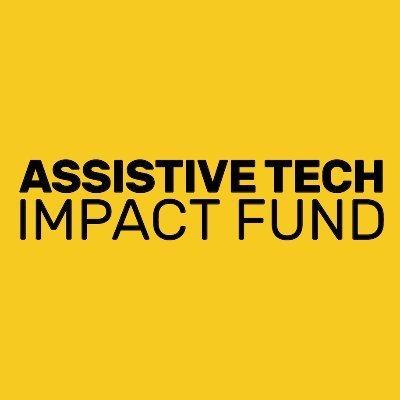
Assistive Tech Impact Fund: £4m fund trialling impact investment
On the International Day of People with Disabilities, the new Assistive Tech Impact Fund (ATIF) has been launched out of the UK Aid-funded AT2030 programme, led by the Global Disability Innovation (GDI) Hub. It is a collaboration between GDI Hub, Brink, Tamara Giltsoff and Catalyst Fund. The partnership combines deep expertise in AT, innovation and venture building in Africa, respectively.
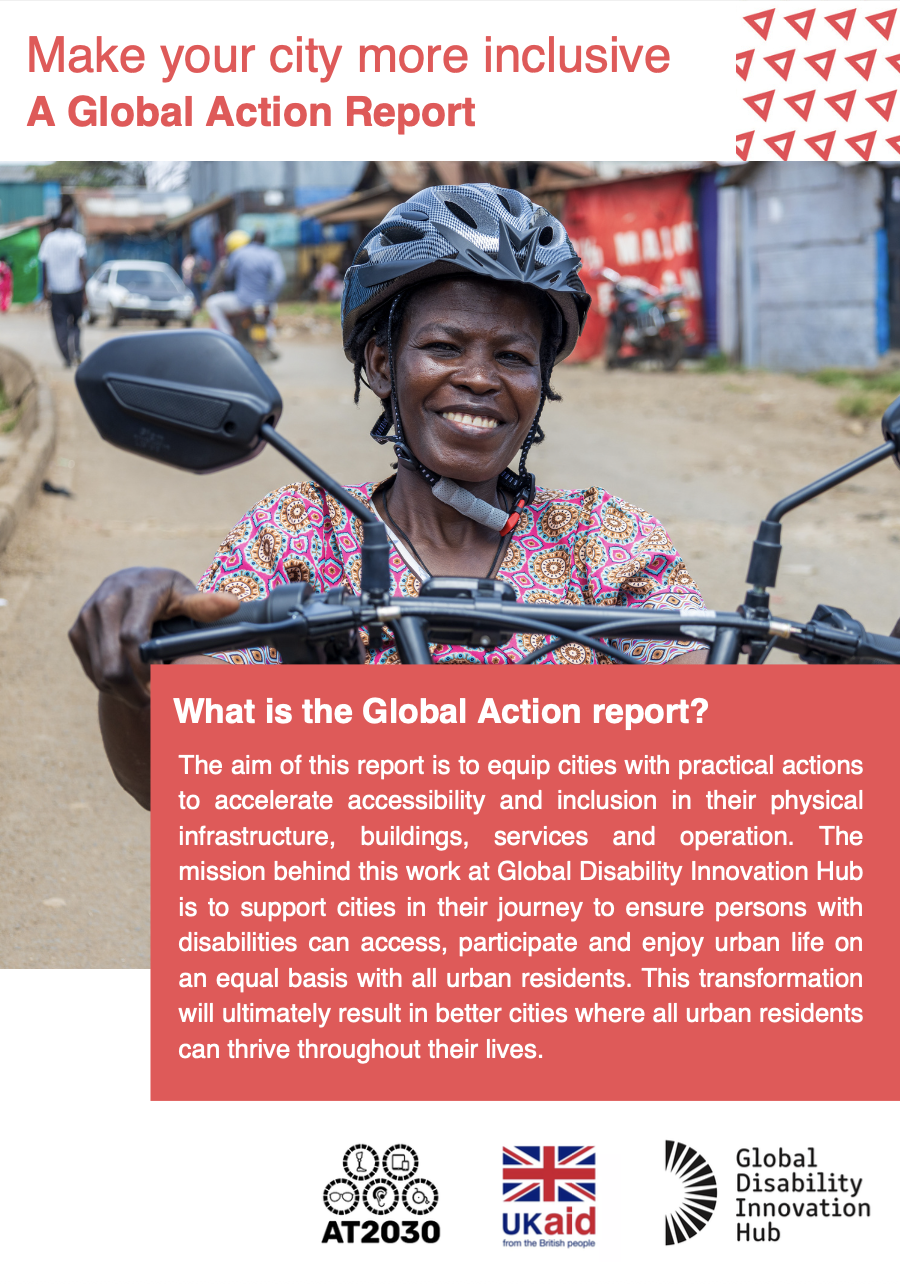
Make Your City More Inclusive: A Global Action Report
First presented at the Global Disablity Summit, The "Make Your City More Inclusive: A Global Action" report offers cities practical actions to accelerate accessibility and inclusion in their infrastructure, buildings, services, and operations.
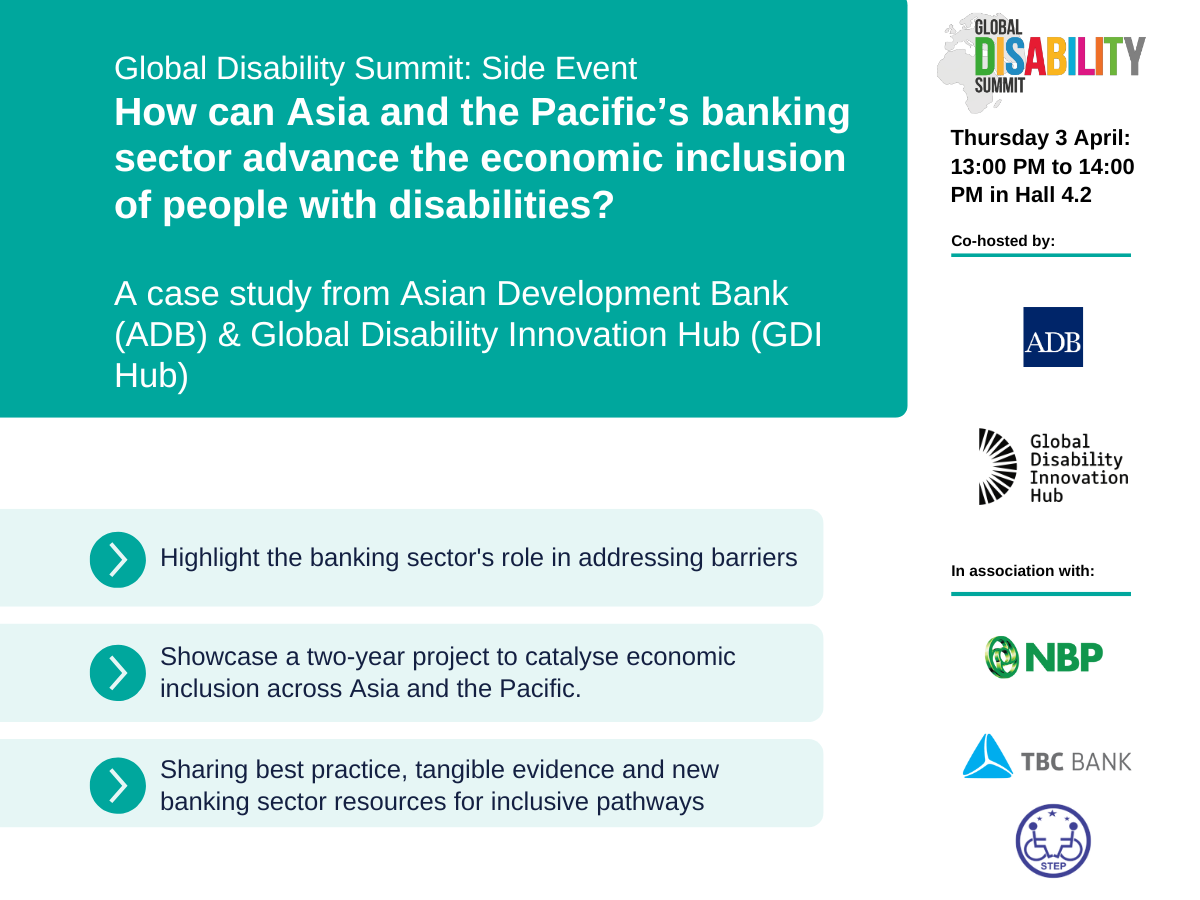
Global Disability Summit: Accessibility 2030 booth
We thrilled to bring Accessibility 2030 to the Global Disability Summit (GDS) to drive urban accessibility. Led by GDI Hub with key partners, our booth will showcase innovations, tools, and case studies, sparking collaboration for more inclusive cities.

Global Disability Innovation Hub to lead two sessions at World Urban Forum on Inclusive Cities and Climate Resilient Infrastructure
Global Disability Innovation Hub is excited to lead two sessions at World Urban Forum 12 on Inclusive Cities and Climate-Resilient Infrastructure.
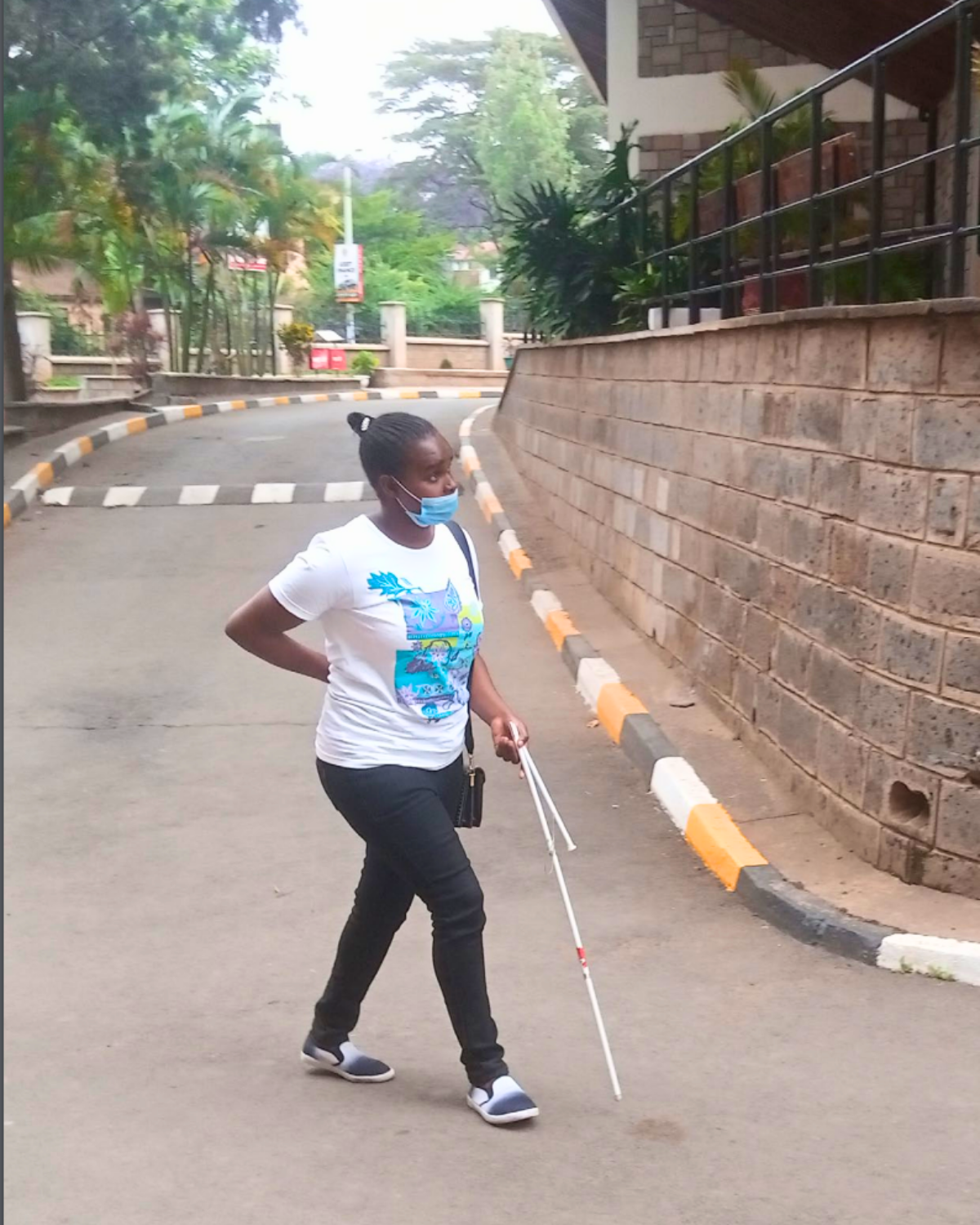
From Global Insight to Local Action
This blog presents the global insights gathered from four years of research undertaken by the Global Disability Innovation Hub, funded by UK International Development under the AT2030 programme. The overarching research question was, ‘What is the current state of inclusive and accessible environments and infrastructure in lower-and-middle-income countries (LMICs), and what is the role of inclusive design in creating an enabling environment for persons with disabilities?’
Assistive Technology Data & Insights Portal - a vision for a highly accessible tool to serve the global Assistive Technology ecosystem
Globally the AT space is developing rapdily, and alongside this comes a growing demand for highly accessible data & insight portal to serve the wider ecosystem, stakeholders, researchers and decision makers. Without a relevant and accessible source of data and insight, participants are struggling to connect, engage, research, invest, source, scout, procure, and contribute to the evolution of this nascent and rapidly growing global ecosystem. We are looking to change this.